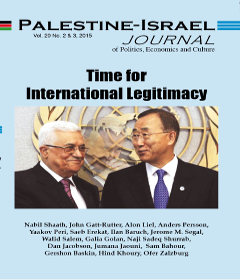The storm caused by the Israeli prime minister’s pre-election comments against the Palestinian campaign to internationalize the conflict and seek a solution through international channels seems to have quieted for the moment. Binyamin Netanyahu is busy forming his new coalition government; Palestinian Authority Presdient Mahmoud Abbas (Abu Mazen) is continuing his international tour; the region is occupied with the internal wars in Syria, Iraq and Yemen; and Iran’s nuclear talks with the West are still a major focus of concern.
Is this the calm before another storm? Is the region on the verge of another surprise alongside the Palestinians seeking internationalization of the conflict? It’s hard to predict, but in any case the Israeli-Palestinian conflict remains the time bomb that may explode any moment, and ignoring this problem or sweeping it under the carpet will not make it any less urgent.
The occupation is becoming more brutal than ever before. The daily headlines in the local Palestinian newspapers, TV, radio and electronic media are about attacks by West Bank settlers against the unarmed civilian Palestinians in villages and towns neighboring Jewish settlements, the demolition of Arab homes in occupied East Jerusalem and the suffering of Palestinian prisoners in Israeli jails.
This kind of daily news, in addition to the absence of any political horizon for ending the occupation, together with the provocations and crimes of settlers against Palestinians, is the major source of incitement of Palestinians against the Israeli occupation. It also exerts extraordinary pressure on the Palestinian leadership to do something for the sake of its own people, who are victimized by both the settlers and the military occupiers.
The failure of peace negotiations for more than twenty years, and the shift within Israeli society toward right-wing and extreme nationalist views, leaves no hope that the solution will come as a result of change in Israeli government policies. Netanyahu’s statements on the eve of the elections that his government, if he won the elections, would never allow the creation of a Palestinian state leaves no doubt about the real intentions of the Israeli leadership and no hope that Israel and the Palestinians will be able resolve their problems on their own.
On the other hand, the Palestinian campaign to internationalize the conflict seems to be facing problems. In general, there is a lack of interest in the region for resolving this conflict because other issues are at the top of regional concerns. And this is accompanied by an unclear Palestinian position. The Palestinian leadership appears to lack the political will to go ahead into high gear because of tremendous pressure from the U.S. and uncertainty about its chances of winning support in the United Nations Security Council.
Peace and stability in the Middle East are not only in the Palestinians’ interest but also in the Israelis’ interest, and a regional and global one as well. An end to the Israeli-Palestinian conflict would positively contribute to the resolution of other regional disputes and bloody conflicts and, by restraining religious fanatics in Israel and their counterparts in the region at the same time, would stop or prevent further deterioration down the path of religious fanaticism and extremism. Internationalization of the conflict is an SOS distress signal from both peoples — the people of Israel and the people of Palestine.

